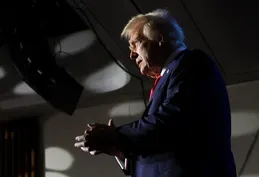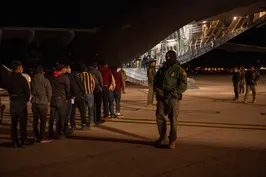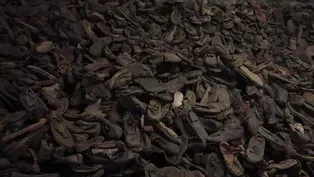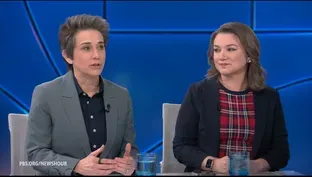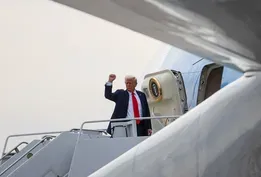
Firing of government watchdogs raises fraud concerns
Clip: 1/27/2025 | 6m 27sVideo has Closed Captions
Trump's firing of independent watchdogs raises concerns about government fraud and ethics
In another sweeping move of his second term, President Trump fired more than a dozen inspectors general, the non-partisan watchdogs appointed to protect against abuses of power, waste and mismanagement across federal agencies. White House correspondent Laura Barrón-López discussed the impact with Glenn Fine, former inspector general for the Department of Justice.
Major corporate funding for the PBS News Hour is provided by BDO, BNSF, Consumer Cellular, American Cruise Lines, and Raymond James. Funding for the PBS NewsHour Weekend is provided by...

Firing of government watchdogs raises fraud concerns
Clip: 1/27/2025 | 6m 27sVideo has Closed Captions
In another sweeping move of his second term, President Trump fired more than a dozen inspectors general, the non-partisan watchdogs appointed to protect against abuses of power, waste and mismanagement across federal agencies. White House correspondent Laura Barrón-López discussed the impact with Glenn Fine, former inspector general for the Department of Justice.
How to Watch PBS News Hour
PBS News Hour is available to stream on pbs.org and the free PBS App, available on iPhone, Apple TV, Android TV, Android smartphones, Amazon Fire TV, Amazon Fire Tablet, Roku, Samsung Smart TV, and Vizio.
Providing Support for PBS.org
Learn Moreabout PBS online sponsorshipGEOFF BENNETT: In another sweeping move of his second term, President Trump has fired more than a dozen inspectors general.
Those are the nonpartisan watchdogs appointed to protect against abuses of power, waste and mismanagement across federal agencies.
Our White House correspondent, Laura Barron-Lopez, has more on the impact of this purge.
LAURA BARRON-LOPEZ: The wave of dismissals began on Friday night and spanned various government agencies, including the Department of Defense and Department of Health and Human Services.
Even some members of the president's party are suggesting the firings violate federal law, which requires Congress to receive at least 30 days' notice and reasons for removal.
Mark Greenblatt, who was fired from his post as inspector general of the Interior Department, told the "News Hour" earlier that he was heartbroken when he received notice of his firing Friday night.
MARK GREENBLATT, Former Inspector General, Department of Interior: The biggest fear that I have is, frankly, is the politicization of the inspector general community.
I think this should be -- should send up some red flags for the American taxpayer.
We have to make sure that the mechanism of the inspector general is independent and apolitical.
LAURA BARRON-LOPEZ: To discuss the impact of this decision, I'm joined by Glenn Fine, former inspector general for the Department of Justice in the Clinton, Bush and Obama administrations.
And he also served as acting inspector general of the Defense Department during President Trump's first term, until Trump fired him.
Glenn, thank you so much for joining.
To start, why are inspector general so essential to providing checks and balances for the federal government?
GLENN FINE, Former Acting Inspector General, Department of Defense: Well, thank you for having me.
Inspectors general are crucial to detecting and deterring waste, fraud and abuse, promoting the economy, efficiency and effectiveness of federal agencies, and preventing misconduct.
They are established by the Inspector General Act of 1978, and they're supposed to be independent and objective units located with each -- within each federal agency to do their critically important mission.
They return money to the federal treasury, they deter misconduct, and they also let the taxpayers know how their dollars are being spent.
So it's important to support these independent and objective watchdogs.
LAURA BARRON-LOPEZ: Could firing these watchdogs imperil holding the government accountable?
GLENN FINE: It could.
It's important that they be viewed as apolitical and not tied to one party or another.
So, historically, they have remained when the administrations have changed and they're rarely fired even within the term of an administration.
After 1978, the first time there was a change in administration, President Reagan did treat them like other political appointees.
He removed them.
But there was a hue and cry in Congress.
Since then, presidents have rarely fired inspectors general, maybe one or two or a few here or there, but not this mass firing.
And the mass firing potentially undermines their independence, their effectiveness, and trust that they are actually doing the jobs without regard to political considerations.
LAURA BARRON-LOPEZ: I want to get your thoughts on something that Hannibal Ware, the inspector general for the Small Business Administration, said on Friday.
He was also terminated.
And he wrote a letter saying "We do not believe the actions taken are legally sufficient" because they didn't adhere to that 30-day window.
Can you explain this more?
And are there any options or paths of recourse for the inspectors general or Congress?
GLENN FINE: So, the Inspector General Act requires the president, if he wants to remove an inspector general, to give the reasons why 30 days in advance to Congress, and the reasons have to be a substantive rationale with detailed and case-specific reasons.
That amendment was passed in 2022 in a bipartisan way, and it's in order to give Congress notice of the removal of an inspector general.
And it does not prevent the president from removing an I.G.
But it describes the process which must be followed.
That apparently didn't happen.
Congress did not get that notice, and it's important to get that notice.
And it doesn't -- that doesn't seem to have happened.
LAURA BARRON-LOPEZ: And you served throughout four different administrations.
Over the weekend, President Trump said that firing the I.G.s was a -- quote -- "very common thing to do."
And a White House official told "News Hour" that the fired I.G.s are -- quote -- "partisan bureaucrats" who -- quote -- "no longer deserve to serve in these appointed positions."
What's your response to the administration?
GLENN FINE: It is not a common thing to do.
As I mentioned after, the transition from President -- to President Reagan, it has not happened on a mass basis.
I don't consider them bureaucrats.
They range the gamut, these inspector general.
Some were appointed by Trump.
Some were leaders of the I.G.
community.
Some have issued hard-hitting reports against both administrations, including the Biden administration.
So they have -- many of them have done a good job.
And that's the rationale for the 30-day notice with the specific reasons, case-specific reasons, why the president is removing an inspector general.
And waste, fraud, and abuse should not be a partisan issue.
It is not a partisan issue.
Both sides of the aisle rely on inspectors general.
Congress relies on inspectors general for important reports and for information.
So it's important that they be viewed as independent and aggressive and that they not be chilled in their ability to find misconduct and report on misconduct regardless of the administration.
LAURA BARRON-LOPEZ: Glenn, what would you say to taxpayers, to the American public about why they should care about these firings of inspectors general?
GLENN FINE: I think inspectors general are some of the most important public servants you haven't heard of.
People are hearing about them now.
But, as I said, they return money to the Treasury.
They deter waste, fraud, and abuse.
They're not a panacea.
There surely is waste, fraud, and abuse in this government.
But inspectors general are an important part of rooting it out, reducing it and holding officials to account.
They should be relied on.
And it's important that they be viewed as apolitical.
In fact, the Inspector General Act says they must be selected without regard to political affiliation.
And that's what gives them their credibility and the trust of the American government that they're doing their job effectively and without fear or favor.
LAURA BARRON-LOPEZ: Glenn Fine, thank you for joining the "News Hour."
GLENN FINE: Thank you for having me.
200,000 displaced Palestinians walk home to northern Gaza
Video has Closed Captions
200,000 displaced Palestinians walk home to northern Gaza after 15 months of war (1m 47s)
Chinese AI startup DeepSeek shakes up the industry
Video has Closed Captions
Chinese AI startup DeepSeek shakes up industry and disrupts financial markets (5m 50s)
Colombia spat may be sign of Trump's Latin America strategy
Video has Closed Captions
Public spat with Colombia could be sign of Trump's Latin America strategy (4m 55s)
Fear spreads in immigrant communities as raids escalate
Video has Closed Captions
Fear spreads in immigrant communities as raids and deportations escalate (6m 46s)
Museum preserves shoes of youngest Auschwitz victims
Video has Closed Captions
Museum works to preserve shoes belonging to Auschwitz's youngest victims (7m 48s)
News Wrap: Trump signs executive orders focused on military
Video has Closed Captions
News Wrap: Trump signs executive orders focused on military (5m 31s)
Tamara Keith and Amy Walter on Trump's rapid policy rollout
Video has Closed Captions
Tamara Keith and Amy Walter on Trump's rapid policy rollout and reaction to his first week (7m 19s)
Trump gathers with GOP lawmakers to map out his agenda
Video has Closed Captions
Trump gathers with GOP lawmakers to determine tactics to move his agenda forward (5m 4s)
Providing Support for PBS.org
Learn Moreabout PBS online sponsorshipMajor corporate funding for the PBS News Hour is provided by BDO, BNSF, Consumer Cellular, American Cruise Lines, and Raymond James. Funding for the PBS NewsHour Weekend is provided by...



